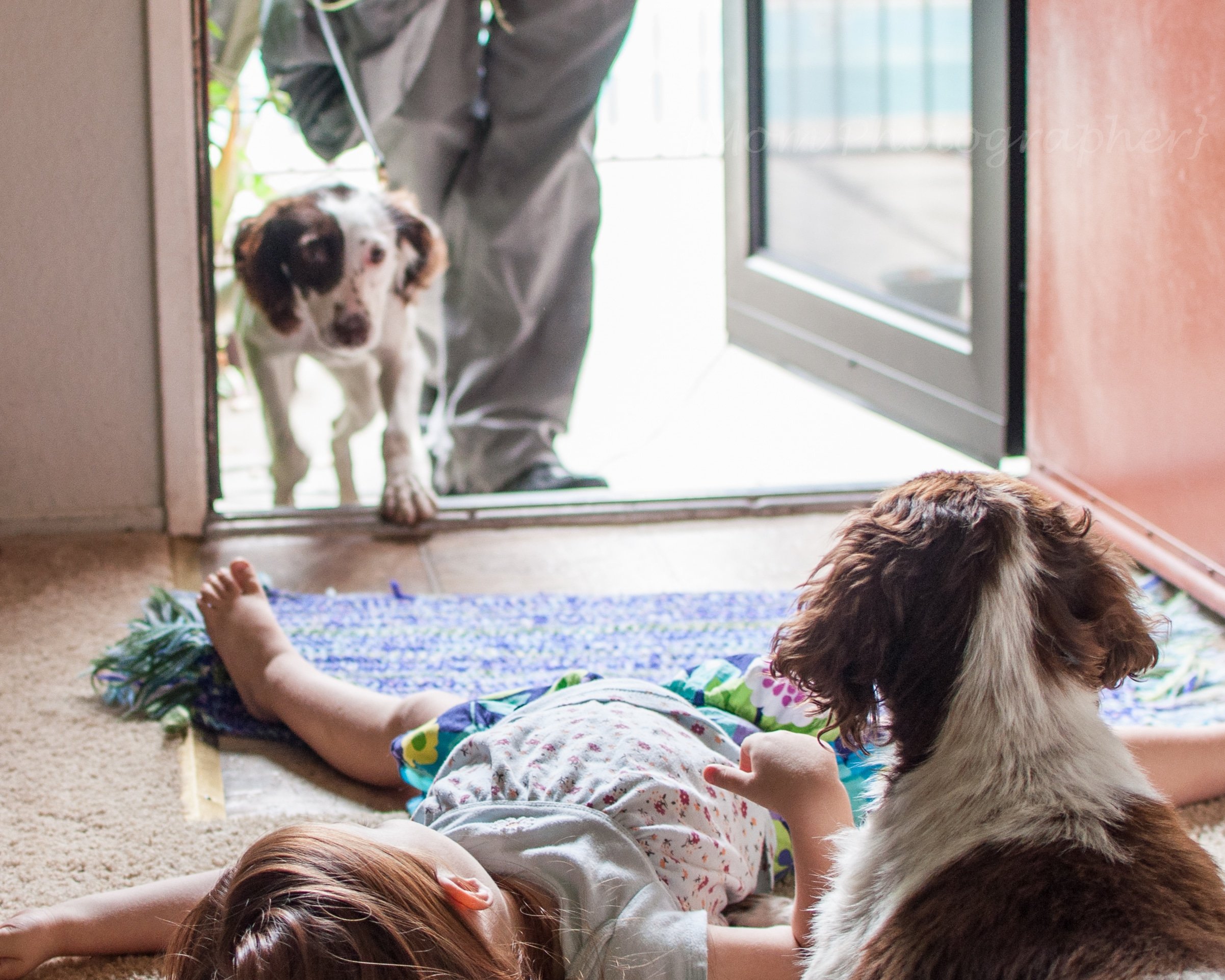
by Ewa Samples | Jul 12, 2013 | 2013, Babies, Communication, Domesticity, Family, Husband, Kids, Life Balance, Life Lesson, Maternal Health, Motherhood, Polish Mom Photographer, Relationships, World Motherhood, Younger Children
 A few months ago, while waiting in our laundry room, I saw some magazines left on the table. I picked one of them and started flipping through. Being in a not so very happy period of my life, one article drew my attention: Give yourself a happiness makeover. Beneath the title: Longevity expert, Dan Buettner traveled the globe to discover what makes people happiest. This caught my attention more than the title itself.
A few months ago, while waiting in our laundry room, I saw some magazines left on the table. I picked one of them and started flipping through. Being in a not so very happy period of my life, one article drew my attention: Give yourself a happiness makeover. Beneath the title: Longevity expert, Dan Buettner traveled the globe to discover what makes people happiest. This caught my attention more than the title itself.
Essentially it was an article about how to improve your happiness in 10 steps. I normally don’t read that crap but then I thought: what the heck, it won’t hurt me.
So here are a few steps listed in this article:
- “Make the most of your mornings.”: CHECKED. Two kids (one newborn), three if counting husband, four if counting a recent (at that time) addition of a high-maintenance puppy to our family. I didn’t even remember my mornings…I didn’t even remember my name!
- “Stop spending; start saving.”: Don’t have much to spend or save, I thought. CHECKED.
- “Get a daily dose of friends.”: Well, I have 303 friends on Facebook…CHECKED, right?
There was even advice for those who don’t go to church: “Start going.” Duh!
Anyway, the list went on, and then, there it was, the golden advice: “Gain Peace With a Pooch.” Now it got more interesting! (more…)
Ewa was born, and raised in Poland. She graduated University with a master's degree in Mass-Media Education. This daring mom hitchhiked from Berlin, Germany through Switzerland and France to Barcelona, Spain and back again!
She left Poland to become an Au Pair in California and looked after twins of gay parents for almost 2 years. There, she met her future husband through Couch Surfing, an international non-profit network that connects travelers with locals.
Today she enjoys her life one picture at a time. She runs a photography business in sunny California and document her daughters life one picture at a time.
You can find this artistic mom on her blog, Ewa Samples Photography, on Twitter @EwaSamples or on Facebook!
More Posts - Website
Follow Me:





by Ecoziva (Brazil) | Jun 17, 2013 | Babies, Being Thankful, Birthing, Brazil, Family, Health, Home, Humanity, Husband, Inspirational, Motherhood, Pregnancy, Spirituality, Womanhood, World Motherhood, Writing, Younger Children
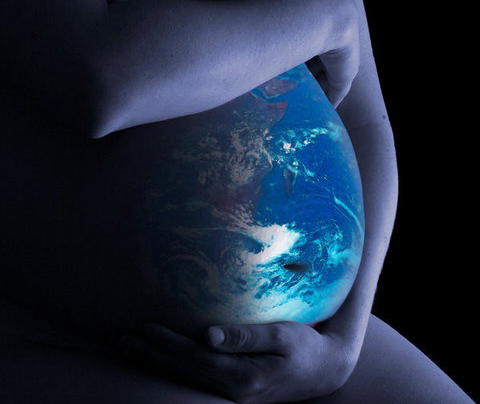
Coincidence or not, about five minutes after the encouraging message the contractions began. At first I didn’t want to admit they were contractions – not even to myself. It is true that they were different from any kind of contraction I had felt before. They were restricted to a small area of my lower abdomen and were less painful. By then my husband had already filled in the tub and after a while I finally accepted I was in active labor and agreed that he turn on the water heater.
The warm water calmed me and I managed to get all thoughts out of my mind. The fear was completely gone. I soon figured out that each contraction lasted exactly the time it took for me to mentally recite four prayers I knew by heart due to my Catholic upbringing: Our Father, the Hail Mary, the Guardian Angel and the Saint Germain prayers. I used that as a meditation and it made the contractions quite bearable.
What was happening around me is all jumbled in my mind and I don’t really remember. I know that our daughter had become fully awake, while our son completely blacked out no matter how much his father tried to wake him. My husband was also running around back and forth organizing things (I think).
The midwife arrived at around 11:30 p.m. with her daughter (an apprentice midwife), a doula, and her sister, an acupuncturist. After talking with them for a while I reluctantly left the water to be examined. The baby’s heartbeat was fine and I was 7 cm dilated.
Since my daughter’s labor had progressed a bit faster I was slightly discouraged thinking I still had another hour or so before reaching full dilation. However, at this point the midwife asked permission to try something new with me. She (who is also an acupuncturist) and her sister had recently learned a way to diminish the pain in labor and I would be the first they would try it on. They also wanted to try a technique where I would push as little as possible and let the baby come out softly in order to avoid tearing (this was due to my big babies and the enormous tear I had the previous time).
No, the pain did not diminish (much to the contrary!). Yet what happened after she placed the acupuncture needles was equally amazing. Things sped up considerably and in two or three contractions I felt like pushing. Not only did I feel like pushing but I couldn’t help it – so much for letting the baby come out slowly! Differently from my previous labor processes, where the pushing phase felt much more like a need to go to the bathroom, this time these contractions were quite painful.
During my daughter’s labor process I held back for a while during the pushing phase because I was afraid of tearing. This time I just wanted to get it over with and see our son. Not simply get over with labor – I wanted to put it all behind me, all the months of illness after illness, all the fear, and now the pain.
At some point our daughter (who was watching everything outside the tub, right behind me) started crying, I guess from all the faces I was making as I pushed. I reassured her mommy was fine and my husband picked her up.
I pushed so hard I began to feel my blood pressure drop as if I was going to faint. I asked for the water-honey mixture my husband had prepared while the midwife pressed an acupressure point straight below my nose, and I soon felt better.
I checked to see how far the baby was from crowning and was once again discouraged when I felt the head about 10 cm away. The midwife reassured me that it wouldn’t take long for him to descend and in the next contraction I pushed with all my might. I checked again and the seemed the distance seemed to have decreased by half.
Amidst all this, everyone in the room was singing a beautiful song that talked of world peace, union and love. What a wonderful way to welcome a new being onto this planet! Over the next days this song was in my head, and every time a warm feeling came to my heart, along with a wish that more children could come into the world in such a loving, harmonious way. I truly believe it would contribute to a more peaceful Earth.
Two or three contractions later he emerged. It was 34 minutes past midnight. I remember the first words the midwife told me, smiling, were “You broke a record!”
I asked if the cord was around his neck and she said yes and removed it. Then he came straight to my breast. I had felt a great sense of relief and contentment after my two other children were born – even after the C-section, but nothing can be compared to this time. All of a sudden I felt like a completely new woman, fearless and full of energy, and who seemed to never have been ill or in pain.
After the cord stopped pulsating, my husband cut it and we waited for the placenta, chatting excitedly. I had thought of having a Lotus birth, but after so much havoc I realized now I just wanted to rest. I donated the placenta to the midwife as she uses it to make homeopathic medicine.
All in all – despite the initial fear and panic – it was a wonderful birth, a great gift after such a difficult pregnancy. As I finish writing this our beautiful baby boy (the best gift of this entire story!) is sleeping peacefully next to me.
How was/were your birthing experience(s)? Please share.
This is an original post to World Moms Blog from our mother of three in Brazil, Eco Ziva.
Eco, from the greek oikos means home; Ziva has many meanings and roots, including Hebrew (brilliance, light), Slovenian (goddess of life) and Sanskrit (blessing). In Brazil, where EcoZiva has lived for most of her life, giving birth is often termed “giving the light”; thus, she thought, a mother is “home to light” during the nine months of pregnancy, and so the penname EcoZiva came to be for World Moms Blog.
Born in the USA in a multi-ethnic extended family, EcoZiva is married and the mother of two boys (aged 12 and three) and a five-year-old girl and a three yearboy. She is trained as a biologist and presently an university researcher/professor, but also a volunteer at the local environmental movement.
More Posts
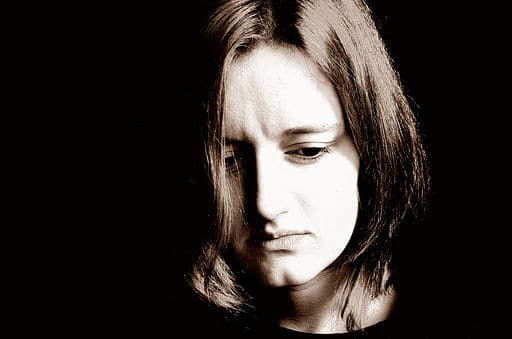
by Carol (Canada) | Jun 7, 2013 | Babies, Canada, Communication, Culture, Family, Health, Infertility, Kids, Loss of Child, Maternal Health, Miscarriage, Motherhood, Pregnancy, Relationships, Womanhood, Working Mother, World Motherhood, Younger Children

Recently, when I was around 10 weeks pregnant, I went in for a dating ultrasound.
My midwife wanted to confirm my baby’s due date, because we suspected that I was actually 9 weeks along, or maybe 11 weeks.
The radiologist discovered that my baby was dead – had died at 8 weeks and 4 days… whenever that had been.
We all know that miscarriage is always a risk, but it’s still a shock to go in for a routine ultrasound with a seemingly healthy pregnancy… and then leave in tears talking about getting a D&C.
A week later I was sedated and the remains of my baby were scooped out of me.
I was heartbroken. I was grieving.
But I was also very lucky: I had immense amounts of support.
I had friends texting me constantly asking what they could do to help. My house smelled like roses, because the girls at work sent me a big bouquet of flowers. My neighbours invited our son over for dinner so we wouldn’t have to fake cheerfulness with him, and left cookies in our mailbox.
The love and support I received contrasted violently with the experience of a friend, who was fired from work after her miscarriage, who got no flowers, no cookies, and whose grandmother and mother-in-law both hurt her frequently by nagging her to produce a baby.
But it’s not a fair comparison – you see, I told people about my miscarriage.
My friend did not.
The conventional wisdom – in our part of the world at least – says that you shouldn’t even tell people that you are pregnant, lest you miscarry. Better to wait until the second trimester, when your risk of miscarriage drops dramatically.
The implied assumption is that you don’t want to tell people about your miscarriage, so it’s better keep your pregnancy a secret until that danger has passed.
I want to know: Why don’t we want to talk about miscarriage?
For many women, miscarriage isn’t just a matter of, “Oops, never mind, no baby after all!” While some may feel that way, and that’s fine, others can be devastated.
I wasn’t just mourning the 8 week jellybean inside me. I was weeping for the baby I had been expecting, my Christmas baby, and as I wept, I clutched the little newborn sized Christmas pajamas that I had already bought.
And sometimes these women suffer side by side.
I had two friends who miscarried close to each other. Both told me, neither told the other. They each thought they were alone. Neither knew what the other was going through. Neither knew that they had something in common.
When I announced my loss at work, every woman over 35 had a miscarriage story to share.
Just think – of the ten women at my work, four have had miscarriages. And none of them talked about it… until I announced mine.
They shared their grief with me, and we hugged each other, and listened to each other’s stories.
And I wondered… why aren’t we supposed to do this?
Why do so many women keep miscarriage a secret, often not even telling friends or family members? Why do some women keep their pregnancies a dark secret, just out of fear that the pregnancy might end?
There’s an element of shame that hovers around miscarriage.
People think that talking about their miscarriage somehow addresses a failure, as if they had made a mistake.
It’s natural to blame yourself for your miscarriage. My first thought was, “What did I do wrong?”
The first thing my midwife said to me was, “You did nothing wrong.”
When I spoke to the nurse at the Early Pregnancy Assessment Centre, she told me that 97% of the time, miscarriages are caused by chromosomal abnormalities and have nothing to do with the mother’s actions.
When I went on to worry that something I was exposed to at work might have killed my baby – x-rays, or pesticides – she told me, “We see a LOT of women in here who are pregnant, but don’t want to be. You wouldn’t believe the crazy stuff they have tried to end the pregnancy at home. It never works. Trust me – there is nothing you could have done to bring this on yourself.”
My miscarriage was not my fault.
I didn’t fail, and the women who have told me about their miscarriages didn’t fail either. So why do we treat it like a failure?
But even the term “miscarriage” implies some fault on the woman, as if I had dropped the baby in a moment of thoughtlessness. In fact, some women have even been prosecuted for their miscarriages.
So we don’t tell people about it.
In a culture where you aren’t supposed to talk about your miscarriage – or even your first trimester pregnancy lest it end in miscarriage – families grieve for their lost babies in a vacuum of shame and secrecy.
There is no funeral. No compassionate leave. No Hallmark cards. But that doesn’t make it less real of a loss.
Even women who aren’t grieving their miscarriage – perhaps they didn’t even want the baby – feel the need to hide it due to the stigma around it.
And that’s never going to change unless people start talking.
Until we bring miscarriage into the light, it will remain a dark, hidden secret.
Until people start talking about it, people won’t know how to respond to it appropriately. Until we remove the stigma, the shame will continue.
Until we talk about it, people will continue to suffer in silence.
Because if you don’t tell anyone unless they have had a miscarriage too, how does anyone who has miscarried find each other?
It just takes one person to speak out, to announce their loss like it is any other loss, and the stories and support come pouring in.
So we need to speak up.
We need to tell people when we suffer a loss. We owe them that, and we owe ourselves that, because for all we know, they need someone to talk to, too. Don’t assume that they don’t know what you’re going through, because chances are, they do.
I’m asking all of you to be brave.
Talk about it on Facebook.
Tweet it, #talkaboutmiscarriage.
Tell people you don’t know very well.
Tell them if you’re grieving. Tell them if you aren’t.
There’s no reason to hide what has happened, or how you feel about it. Chances are neither the experience, nor your emotions, are unique to you.
Only by opening those doors can we find the support we need, and join together the women who have been suffering in silence for all this time.
Have you or has someone close to you had a miscarriage? How did cultural attitudes toward it affect the grieving process?
This is an original post for World Moms Blog by Carol. She can be found blogging at If By Yes and on Twitter @IfByYesTweets.
Photo credit to Jiri Hordan. This photo has been released into the public domain by its author, Jiri Hordan.
Carol from If By Yes has lived in four different Canadian provinces as well as the Caribbean. Now she lives in Vancouver, working a full time job at a vet clinic, training dogs on the side, and raising her son and daughter to be good citizens of the world.
Carol is known for wearing inside-out underwear, microwaving yoghurt, killing house plants, over-thinking the mundane, and pointing out grammatical errors in "Twilight". When not trying to wrestle her son down for a nap, Carol loves to read and write.
Carol can also be found on her blog, If By Yes, and on Twitter @IfByYesTweets
More Posts - Website
Follow Me:


by Karyn Wills | Jun 3, 2013 | Babies, Being Thankful, Health, Kids, Life Balance, Maternal Health, Motherhood, New Zealand, Nutrition, Parent Care, Pregnancy, World Motherhood, Younger Children
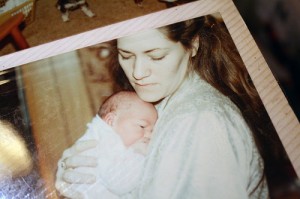 I had my third baby when I was 41. Many people told me I was bonkers and a few refused to congratulate me, but those who knew how it felt to long for a baby, whether that baby was number one or number six, were as delighted as I was.
I had my third baby when I was 41. Many people told me I was bonkers and a few refused to congratulate me, but those who knew how it felt to long for a baby, whether that baby was number one or number six, were as delighted as I was.
I was unfit, I knew that once the baby came I would feel tired, and I knew that I would have no time to myself. We already had one son who felt secure with strong boundaries and a gazillion hugs a day, and another who felt truly secure only while he was attached to my body. I knew that I would have to take each day, each hour, perhaps each minute as it came.
This was my self-imposed Everest: to give completely of myself until all the boys chose to pull away from me or manage my small nudges out of the nest, in order that they properly develop their wings. I figured things would begin to get somewhat easier at around the 18 month to two year mark. A friend, who had also had a third baby in her 40s, said it would take four years. I didn’t believe her.
I hadn’t counted on a 24 hour labour followed by a massive bleed on the operating table during an emergency C-Section. I hadn’t planned on premenopausal bodily hiccups. I never imagined I’d feel like I was churning through porridge day after day, after day, after day. But that’s what I got.
Just before Christmas last year I could stand it no longer. I was barely functioning, and I truly felt like this level of energy was my lot. I had three energetic and wonderful boys who needed a Mum with some oomph and pizzazz. I did a breathing rate test off the internet, and my results were worse than a heavy smoker and the same as someone in heart-failure. I went to the doctor.
It was then that I discovered that my iron and haemoglobin levels were extremely low – I joke that I was three quarters dead. Thankfully, my vitamin B levels were fine, my thyroid was doing its happy dance, and I passed the depression test. I got my iron levels sorted and began to feel a bit better.
Still, I wasn’t feeling great and I did wonder, again, if this amount of energy was my lot.
I tweaked my diet. I began rising earlier and going to bed at the same time as the boys. Our baby turned three and a half, and then three and three quarters.
And now, finally, after close to four years, I am almost back to myself. I cannot possibly regret having a gorgeous and much loved child in my 40s. I cannot possibly regret any of the time or energy I have put into any of my beautiful boys. But I can tell you this in complete confidence:
I am damned pleased to be on this side of the mountain!
How did life events affect how you coped with parenting your babies and toddlers?
This is an original post to World Moms Blog from our contributor in New Zealand, Karyn.
The image used in this post is credited to Lindsey Turner. It holds a Flickr Creative Commons attribution license.
Karyn is a teacher, writer and solo mother to three sons. She lives in the sunny wine region of Hawke’s Bay, New Zealand in the city of Napier.
More Posts

by Kristyn Zalota | Feb 5, 2013 | Babies, Being Thankful, Birthing, Child Care, Clean Birth Kits, Death and Dying, Humanity, Inspirational, International, Maternal Health, Poverty, Social Good, Women's Rights, World Moms Blog, World Voice, Younger Children
This post is the third installment by Kristyn Zalota, Founder of CleanBirth.org, about her work in Laos. To read the first post in the series,click here: “One Mom’s Mission to Save Lives in Laos”. To read the second post, click here: “Small Project Big Impact: Making Birth Safe in Laos”.
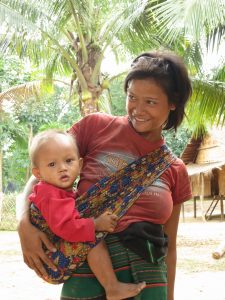 As you may know from my previous posts, I am a mom on a mission to make birth safer in Laos. This month my organization, , has the goal of raising enough funds to save 1,000 mothers and 1,000 babies.
As you may know from my previous posts, I am a mom on a mission to make birth safer in Laos. This month my organization, , has the goal of raising enough funds to save 1,000 mothers and 1,000 babies.
I am a doula, Lamaze educator, and advocate for safe birth for impoverished women. I was drawn to work in Laos, because women there die at a higher rate than Afghani women and Lao babies die at a higher rate than babies in Sudan.
In November 2012, I traveled to southern Laos and, with my Lao partner organization, trained nurses in the use and distribution of Clean Birth Kits. When the nurses told me that women give birth alone, I agreed to fund community education about safe birthing practices
Having completed the nurses’ training, we went deep into the mountains to visit the clinics there. I immediately sensed the grinding poverty of the area. People live on $1 per day. The life expectancy of women is short, either due to childbirth (8-12 births) or disease. Most will lose several babies.
What do you see when you walk into the villages? Naked kids with runny noses. Mothers with babies in slings. Bamboo and wood one-room dwellings on stilts. No electricity, not a single store. While a new road connecting Thailand and Vietnam is bringing change, it is mostly in the form of human trafficking, HIV, and environmental degradation. (more…)
Kristyn brings her years of experience as an entrepreneur and serial volunteer to CleanBirth.org. She holds a MA, has run small businesses in Russia and the US, and has volunteered in Nicaragua, Costa Rica, Thailand, Cambodia, Laos and Uganda on projects related to women’s empowerment.
After having children, Kristyn became an advocate for mothers in the US, as a doula and Lamaze educator, and abroad, as the Founder of CleanBirth.org. She is honored to provide nurses in Laos with the supplies, funding and training they need to lower maternal and infant mortality rates in their villages.
More Posts
by Sophie Walker (UK) | Jan 11, 2013 | Autism, Babies, Being Thankful, Childhood, Discipline, Domesticity, Education, Family, France, Girls, Hobby, Holiday, Home, Humor, Inspirational, Kids, Life Balance, Life Lesson, Me-Time, Motherhood, Parenting, Running, Sophie Walker, Special Needs, Spirituality, Working Mother, World Motherhood, Younger Children
 My mum used to say to me: “Don’t wish your life away.”
My mum used to say to me: “Don’t wish your life away.”
Nowadays I sometimes feel as though that’s all I do. To be more specific, I’m organizing my life away.
With four kids, my job, my husband’s job, and the diaries of both our ex-partners to co-ordinate, there are often times when I look up from the calendar and realise I’ve scheduled myself right out of the current school term and into the next-but-one.
This can be particularly painful when I have to re-adapt to not being in warm late summer and that campsite in France but instead in bleak mid-winter suburbia. January is a bad month for making wishes and looking away from the here and now. “I want to be thinner/fitter/better employed/better loved by X month,” we tell ourselves, shading our eyes as we scan the horizon for that magical time when everything will be perfect.
The temptation to hurry past moments of disappointment or frustration is immense, and only human. I feel this keenly as the mother of a child with autism. School is a big issue for us, and the day-to-day of persuading my child to go and, once there, to participate, is exhausting. (more…)

Writer, mother, runner: Sophie works for an international news agency and has written about economics, politics, trade, war, diplomacy and finance from datelines as diverse as Paris, Washington, Hong Kong, Kabul, Baghdad and Islamabad. She now lives in London with her husband, two daughters and two step-sons.
Sophie's elder daughter Grace was diagnosed with Asperger Syndrome several years ago. Grace is a bright, artistic girl who nonetheless struggles to fit into a world she often finds hard to understand. Sophie and Grace have come across great kindness but more often been shocked by how little people know and understand about autism and by how difficult it is to get Grace the help she needs.
Sophie writes about Grace’s daily challenges, and those of the grueling training regimes she sets herself to run long-distance events in order to raise awareness and funds for Britain’s National Autistic Society so that Grace and children like her can blossom. Her book "Grace Under Pressure: Going The Distance as an Asperger's Mum" was published by Little, Brown (Piatkus) in 2012. Her blog is called Grace Under Pressure.
More Posts

 A few months ago, while waiting in our laundry room, I saw some magazines left on the table. I picked one of them and started flipping through. Being in a not so very happy period of my life, one article drew my attention: Give yourself a happiness makeover. Beneath the title: Longevity expert, Dan Buettner traveled the globe to discover what makes people happiest. This caught my attention more than the title itself.
A few months ago, while waiting in our laundry room, I saw some magazines left on the table. I picked one of them and started flipping through. Being in a not so very happy period of my life, one article drew my attention: Give yourself a happiness makeover. Beneath the title: Longevity expert, Dan Buettner traveled the globe to discover what makes people happiest. This caught my attention more than the title itself.












 My mum used to say to me: “Don’t wish your life away.”
My mum used to say to me: “Don’t wish your life away.”


